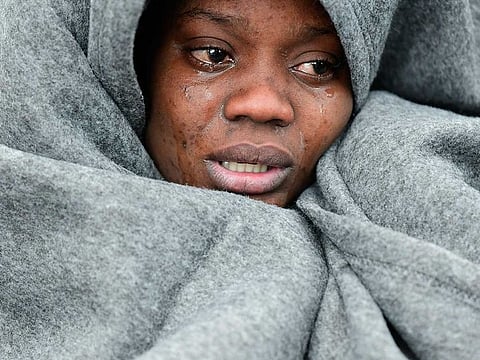Fears rise for Syria’s lost generation
It would take years for many to return, and integration into society will take longer

One Syria related story that has popped up in the news in recent weeks is that of the plight of hundreds of thousands of refugees and displaced Syrians who have been fleeing the aerial strikes, barrel bombs and raining artillery shells by the advancing government troops in the renegade province of Idlib.
Since Damascus, aided by the Russians, launched a major air and ground campaign to recapture the last major rebel bastion, in breach of the limitations set out under the Sochi agreement signed by Russia, Turkey and Iran, the main victims have been civilians; many of whom had sought refuge in Idlib after fleeing other provinces in fear of regime retaliation.
There are an estimated four million people in Idlib today; at least a million of them have set up rudimentary camps near the closed Turkish border. As Turkish forces moved in, two weeks ago, to stop the advance of government troops, thousands of families huddled together near the border have been suffering under unbearable conditions, including bitter winter temperatures, inadequate shelters and lack of food and medicines. Last week The United Nations’ human rights chief, Michelle Bachelet, called the humanitarian catastrophe unfolding in Syria “cruel beyond belief.”
How Erdogan plays the refugee card
Turkey has closed its borders, saying that it can take no more refugees while trying to cope with an estimated four million who are already there. As tensions between Turkey and Europe escalated over Ankara’s controversial Idlib incursion, President Recep Tayyip Erdogan threatened to open the floodgates to millions of Syrian refugees seeking to enter Europe. Thousands of refugees were bused towards the Turkish-Greek land border but were denied entry. Greek anti-riot police attacked them with tear gas and even shot one refugee. The Greek navy prevented boats carrying refugees from Turkey to reach nearby Greek isles. One boy had drowned as the boat carrying him and his family capsized.
The Europeans and Turkey are using the refugee card as leverage in a bigger political game. And it’s not the first time that such a card has been used. Of Syria’s pre-2011 population of 22 million, no less than five million are now living as refugees in neighbouring countries with at least 13 million displaced living under precarious conditions inside Syria itself.
Even when the war ends it would take years for Syrian refugees and those who were displaced to be repatriated. Until then the fate of generations of Syrians will pose the biggest challenge.Osama Al Sharif, commentator based in Amman.
During 2015 more than 500,000 Syrian refugees crossed into Europe, mostly through Greece. The tide had stopped when Turkey and EU countries reached an agreement in 2016 to stop the flow of irregular migration. That deal included giving Turkey six billion euros to help Ankara with its accommodation of Syrian refugees.
But the refugees are only part of the story of the lost generations of Syrians. Latest figures put the number of those who perished in Syria’s civil war at more than 380,000, including 115,000 civilians.
The list of culprits is long: including the [army], rebel groups, Daesh, the Russians, pro-Iran militias including Hezbollah, the anti-Daesh coalition and now Turkey. In a war that targets villages, towns and cities, some completely obliterated, it is impossible to distinguish between combatants and innocent civilians.
Crimes against humanity
Syrian and Russian air strikes have targeted schools, hospitals, mosques, churches, markets and houses. The fate of thousands of Syrians who were taken by the Syrian army remains unknown. There are thousands of testimonies of torture, rape and summary killings. Mass graves have been uncovered in areas that were under regime, rebel and Daesh control. The possibility that one day, long after the war has ended and a democratic regime is installed, that an investigation into possible war crimes and crimes against humanity that were committed in Syria will take place is remote.
Even when the war ends it would take years for Syrian refugees and those who were displaced to be repatriated. Until then the fate of generations of Syrians will pose the biggest challenge. Thousands of children have been born in areas under rebel control and therefore have no way of being registered or get an official birth certificate.
In Jordan a survey of Syrian refugees last year, found that 48 per cent of the Syrian refugee population was below the age of 15. More than 14 per cent of girls around the age of 15 were married, compared to 3 per cent in Syria before the war.
Also, the study found that the moderate and severe prevalence rate of food insecurity is 40 per cent, while the severe prevalence rate is 18 per cent. There are other disturbing findings regarding health and education; and Jordan offers a brighter picture since conditions are generally worse in Lebanon and vary in Turkey.
Aside from the hundreds of billions in material and infrastructure losses, not to mention to the tragic waste of life, in war torn Syria the most painful loss is that of generations of Syrians who are either refugees or displaced inside the country with no access to basic services.
It would take years for them to return under difficult conditions and once they do the integration into society will take longer and will restrain the country’s efforts to rebuild and recover.
— Osama Al Sharif is a journalist and political commentator based in Amman.


